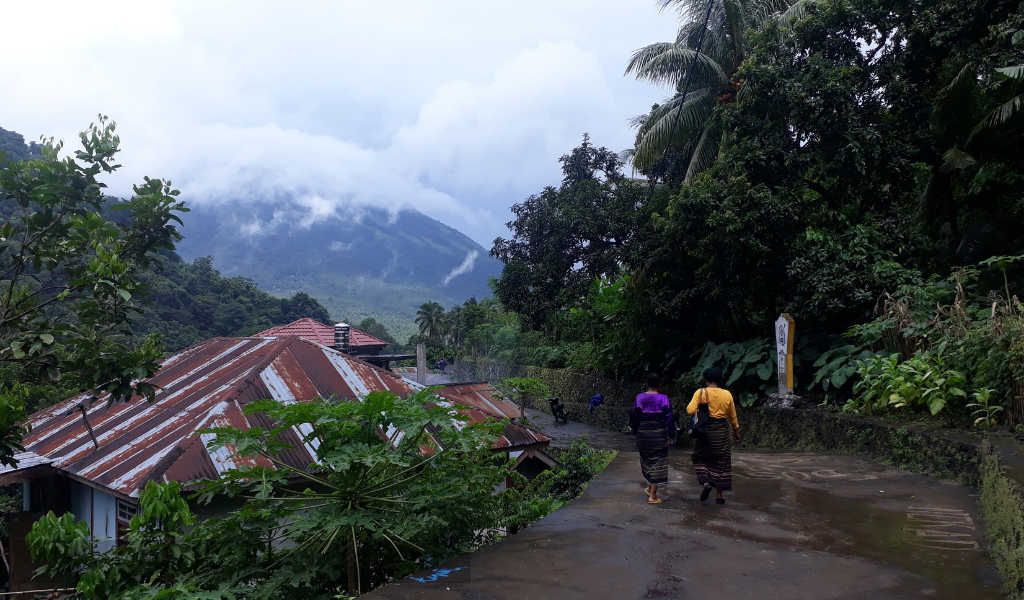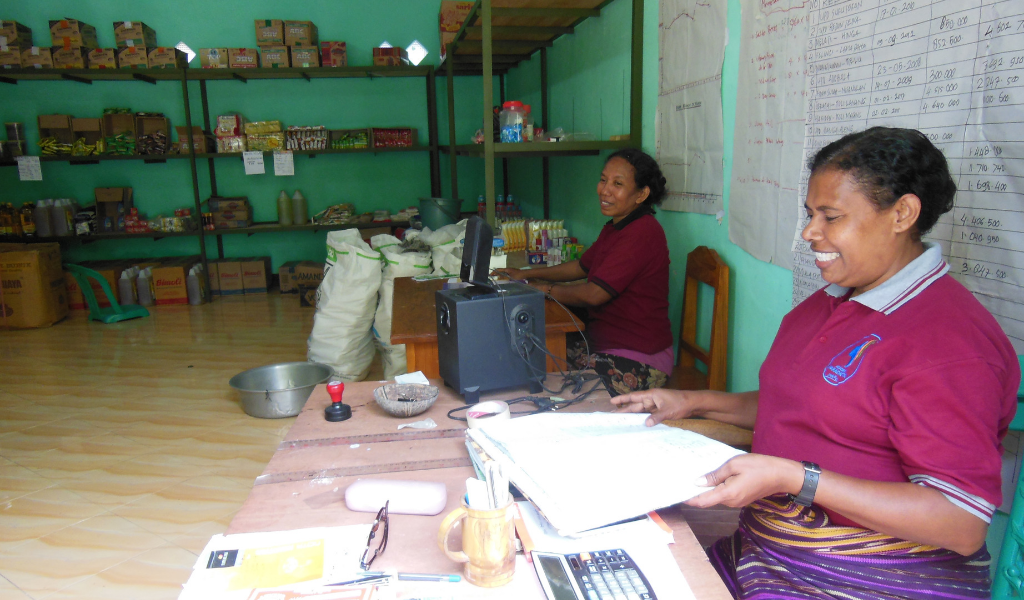Towering over the small island of Adonara in Indonesia, the Ile Boleng volcano is always present in the background. In the nearby village of Adobala, I listened as female heads of households, dressed in sarungs, talked about how they had organised themselves as a women’s group in the local cooperative ‘Lodan Do’e’. The cheerful women didn’t just use the time to talk, but also to weave and make threads or cook coconut oil.

Lodan Do’e is part of the Indonesia-wide PEKKA movement. Since 2001, Perempuan Kepala Keluarga (Women-Headed Household Empowerment, also known as PEKKA) has been addressing the social and economic exclusion of female heads of households in Indonesia. Indonesian marriage law states that household heads are male, and does not recognise women in the role, referring to them in the Bahasa language as janda – a negative, dismissive term referring to widowed or abandoned women.
Today, PEKKA is a membership-based organisation present in 20 of the 34 provinces in Indonesia, helping female heads of households to secure their livelihoods, participate in social, economic and political life, and improve their standard of living.
Self-organisation in cooperatives (economic empowerment) and associations (social and political empowerment) has given over 31,000 members (rural widows, single women, carers for terminally ill husbands, abandoned and divorced women) an autonomous, grassroots voice at village, district, provincial and national levels. Ownership of resources and democratic decision-making of the cooperatives are the key foundations of PEKKA.
In this context, IDS chose PEKKA as one of the case studies for the Open Society Foundations funded research on Linking economic advancements in participation. Alongside case studies on the Buen Vivir Fund and Ghana Civil Society Platform on the IMF Programme, we presented the PEKKA case study during the recent UN Inter-Agency Task Force on Social and Solidarity Economy conference.
Listen to the founder and director of PEKKA discuss the outcomes and challenges of cooperatives below.
Using economic empowerment and participation as foundations for political empowerment.
Our PEKKA case study shows that economic empowerment doesn’t automatically bring about political empowerment. It needs to be enforced and maintained through governmental networks. So, we focused on how the cooperative aims to shift economic power dimensions by increasing voice and agency in economic decision-making for PEKKA members, through three core economic activities:
- Community-based microfinance through savings and borrowing, which aims to increase access to capital by democratic and participatory decision-making and member ownership of the microfinance institution.
- A closed trading and marketing system (PEKKA Mart) which aims to control trading and marketing systems for members who can buy basic groceries as well as selling their produce (individually or collectively produced) back to the PEKKA Mart.
- Economic lobbying and advocacy to help improve the enabling environment, get access to public funds and programmes, and influence economic decision-making on the village, district, provincial and national levels.
Shifting quantities and prices
In the village of Adobala, several women told me they use loans for gadai sawah, which means they pay a small landowner who is in need of the cash, who then gives them permission to use the land for the period of time that the money has not been paid back (usually years). This offers the women, who have no access to communal land, a way to cultivate crops such as coconut, cocoa, cashew nuts and bananas. Some women use the yields of corn and cassava to produce snacks and crackers to sell at the local market.
Having access to loans has also given them the ability to buy larger volumes of all kinds of materials, (for weaving, for example) which means women can haggle and pay less. They can also produce larger quantities of end products, which they can sell for higher prices, as they are then not dependent on a quick sale before they can start their next production.
Far away from any large cities, the majority of the Lodan Do’e cooperative buy rice, cooking oils, salt, sugar, detergents and soaps through the popular and convenient PEKKA Mart. They explained that there are many benefits to being a PEKKA member: profit sharing, flexible payment terms, the possibility to resell products to the community, and time and cost benefits.

The knock-on effect
Interestingly, the members have been using their improved participation in the local economy and their subsequently improved status as a springboard for lobbying and advocacy activities, accessing village and district level public funds for training or the purchase of machinery for their micro-businesses.
However, the women in Adobala don’t think of these advocacy activities with income improvement in mind, although they could positively affect their incomes. For the women, the indirect consequence is more significant; they now have an improved recognition of their economic contribution to the community, which has opened up new social and economic networks and opportunities. They are now valued by their community members and leaders, and have more control over their economic future.
What can we learn from PEKKA?
There are a few lessons learned from PEKKA cooperatives. Firstly, mobilisation of these marginalised women is based on awareness raising, capacity building, a proactive attitude, and an ambition to engage.
Secondly, it takes a long time to build trust and raise awareness. Initially, the government wanted to simply hand out money, but PEKKA insisted that cooperative members needed to accumulate their own funds. Initially that proved difficult, and several cooperatives failed as women said they were too poor to engage with the activities, and save.
Thirdly, the exchange of information within the nationwide network of PEKKA cooperatives has proved to be an important enabling factor to increase awareness and capabilities.
However, there are three important constraints for further economic advancement emerging from this research.
Firstly, the women in Adobala explained that informal village leaders or elders still have informal power over the community that restricts their economic participation. It is difficult to break with some negative gender stereotypes including ceremonies and traditions that negatively influence economic progress, like widows having to pay back the wedding price or dowry to the family-in-law, leaving them with large amounts of debt and holding them back from progressing economically.
Secondly, women have remained pigeonholed into traditional gender roles such as cooking, sewing and weaving and struggle to branch out into other economic activities. However, the benefit of being part of a large national network is that the women on Adonara have hope, seeing good practices elsewhere in Indonesia.
Other PEKKA groups have piloted transport and other services to tourists, while a cooperative on the neighbouring island Lembata is working on a concept for building a dam that would be able hold fish when the tide is low. The women would then be able to collect fish without using boats, which is significant because fishing community traditions dictate that women are not allowed to go out on the sea. When operational, the collected fish would be sold through PEKKA Mart to fish traders.
Finally, the case study has shown that self-organisation in a cooperative has limitations if it does not extend links within the local economy. Building local networks is vital for success. PEKKA Mart has to potential to expand the network outside the strict cooperative structure by working with other traders in a more formal way. PEKKA Mart is experimenting with this, but for many managers and members this is out of their comfort zone. Specific capacity building on how to cooperate with economic actors (beyond the current focus on government actors) is required to maximise the potential of PEKKA Mart.